
Solar Ash (PC) - Review
by Miles Gregory , posted on 12 December 2021 / 3,657 ViewsI skate atop non-newtonian clouds suspended in the abyss. Surrounding me are the remains of demolished societies and decimated metropolises of varying planets coalesced into an urban sprawl of utter desolation. Subway systems and buildings have been ripped apart and scattered haphazardly. An alien woman weeps in a nearby building, lamenting her decisions and apologizing profusely to those who aren’t there. Her mind is too far gone to be helpful on my mission. Aside from myself and the woman, the only other things alive in this pit of loneliness and despair are monsters that seek to destroy me. I’ve learned that these monsters are called remnants, but remnants of what? The question hangs, unanswered, as I continue gliding frictionless among the destruction, searching with hope and vigor for the crew that has gone missing. As I destroy a black goo-like anomaly, a huge being arises from the sea of clouds. This enormous leviathan pervades the city in such a way that makes the city seem paltry by comparison. The beast is awe-inspiring. I cannot help but to think of it as both majestic and frightening. But I know what I must do, I have no other option. I must destroy the beast.
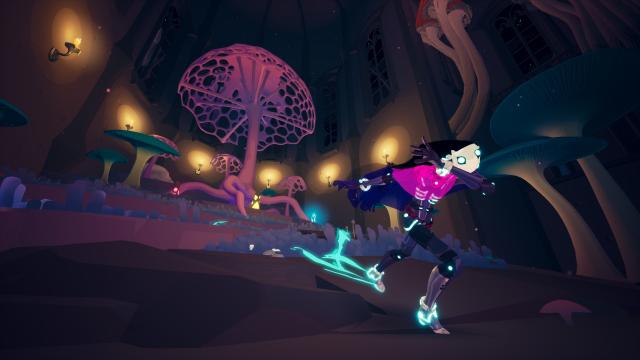
This is just a taste of the experience of Solar Ash. Developed by Heart Machine, the same developers of the esteemed Hyper Light Drifter, Solar Ash seeks to provide the player with a type of emotional experience rarely approached in the medium. You play as Rei, a Voidrunner, who enters into the ultravoid in an attempt to save her crew and destroy the ultravoid, thus saving her planet from being consumed and destroyed by it. By discovering Voidrunner stashes you begin to piece together the mystery of what happened to your crew and why the starseed, the machine that was brought to destroy the ultravoid, didn’t work.
Through your adventure you also meet a handful of others stuck within the ultravoid. These individuals have their own unique stories which fit the game's narrative thematically. Story elements are mostly optional, but the more you dig the more questions you have, and the more interesting it becomes. Piecing together the stories of Rei, the crew, and those locked within the ultravoid quickly became my favorite part of Solar Ash. Though some of the foreshadowing is quite obvious, these moments come a bit later into the game, avoiding giving it away too early. Still, it did detract from a surprise ending, which I feel could have been a bit more impactful to the player. Nevertheless, the growing feeling of despair, sadness, and regret I felt as I pieced together the story are emotions I rarely feel when gaming.
The neon vibrance of Rei contrasts nicely with the environment, particularly the pastel clouds. Though Solar Ash differs significantly graphically from Heart Machine’s previous title, Hyper Light Drifter, it’s apparent how the art direction of that game influenced a similar overall aesthetic. Areas utilize thematic coloring, such as Ironroot Basin with its complementary turquoise and orange. This allows areas to feel distinct from each other, though there are some repeat color coordinations. Along the vistas you’ll notice dilapidated cities from a variety of planets. In the distance you’ll also find Rei’s own planet looming over as a constant reminder of your goal in the game. The artistic direction really helps boost its atmosphere, but graphically it's unimpressive. Trees, buildings, and other environmental objects are very simple geometrically. It is important to keep in mind that it was made by a small team, so it’s difficult to really criticize this aspect too harshly.
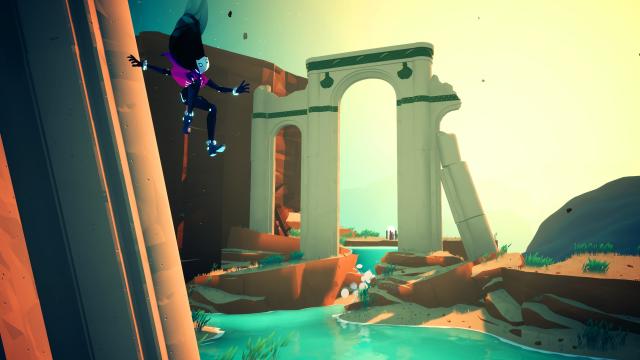
However, despite the low-intensity of the graphical quality, performance on my PC was notably sub-par. The framerate was very erratic, despite both my GPU and CPU being significantly under-utilized. Utilization of my GPU never went past 50%, while the CPU only ever rose to the 20% mark. I attempted to change my settings down to high, medium, and low, but everything aside from the lowest setting still gave me huge dips down into the low 80s and even 70s. Not a huge issue in and of itself, but given the graphical makeup of the game, and the fact that my PC has no problem with more graphically intensive titles at a rock solid 144FPS, I was a bit suspicious. It’s difficult to discern exactly what the problem is, as some busier areas held higher average framerates than ones that were emptier. This seems to indicate it might be a streaming issue within the game itself. If you’re playing on PC, this may be an adventure that warrants capping your framerate to something fairly lower than your machine is capable of to maintain consistency. In addition, there were a handful of times when Solar Ash dropped my framerate in half and maintained this framerate throughout areas I had already explored. I had to exit the game and relaunch it to bring my framerate back up to normal. Lastly, changing the resolution scaling didn’t seem to affect performance in any notable way either. I hoped that these issues would be patched out with a day one patch, but when I received that patch things did not improve, so I hope the developers can look into this further.
From a sound design perspective, I find the pieces very interesting. Solar Ash doesn’t utilize any “catchy tunes”, but what it has are eloquently crafted pieces that toe the line between discordant and melodic. It all fits into the background, exactly where it needs to be, and helps increase the overall atmosphere. The use of synth provides a cosmic and ethereal quality that works with the setting. Even the cries and screams from the remnant's as you defeat them make you feel remorse. Fryda Wolff does a great job voicing Rei as well. Rei feels quick, smart, and confident. At times she even reminded me of another video game heroine, Horizon: Zero Dawn’s Aloy, which is certainly not a bad thing. Though I don’t think that the sound design is going to be winning any awards, I do feel like it helps improve the overall atmosphere of the game and I applaud the quality of the score.
Gameplay is unfortunately where Solar Ash starts to falter. Skating is a big element of the game, and I felt the developers handled it appropriately. It’s fluid and feels nice gliding across the clouds and structures. It feels a bit more like ice skating than rollerblading, so momentum, particularly during turns, works much differently than I initially anticipated. This slippery style of skating allows for a real feeling of momentum as you bob and weave through levels; that is, until you jump. Jumping has the problem of ruining your momentum at unfortunate times. If you push a different direction than exactly forward, the momentum you’ve gained could be lost and will need to be built back up again. This can cause some frustration as the game feels better the faster you’re going. Luckily, you're given a booster that helps you gain that lost momentum pretty easily. Nevertheless, time will be lost, and when a big part of Solar Ash is beating a timer, it can be rather frustrating to have to try again because you jumped too soon or at the wrong angle.
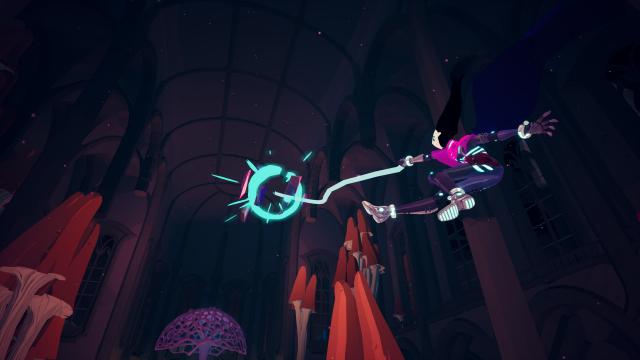
You also have the ability to timeslip, which activates slow motion, and grapple onto specific hooks. When you timeslip it also allows you to grapple onto things from a greater distance. There are also rails to grind on, which are never particularly exciting but feel cool on occasion, and some simple platforming as well. When Solar Ash uses all of these mechanics together it feels great. You’re jumping, boosting, gliding, grinding, grappling, and attacking enemies as you navigate the world. Unfortunately, Solar Ash doesn’t use these mechanics together often enough, at least not in the world overall. It’s really only the very last section of the final area that you begin to feel you’ve mastered these mechanics, but by then the game is practically over and it feels too short-lived.
There isn’t much to say about the combat either, unfortunately. There are no combos and there isn’t much strategy. You glide up to an enemy, press the button to slash, then repeat that until the enemy is dead, which doesn’t take long. Enemy variety is practically non-existent. Aside from bosses, I believe there are really only four or five types of enemies in the game. However, despite the simple combat mechanics, boss fights are high adrenaline encounters. This is where Solar Ash actually shines and its true potential can be seen, if only for a moment. Before you face a boss, known as both massive anomalies or remnants, you must find smaller parts of the remnant, known as anomalies, and destroy them. How you destroy the smaller anomalies is a bit like a time challenge with slight puzzle elements. You have to slash at spears protruding out of a black goo-like substance. Sometimes this requires solving a brief puzzle, such as creating a grind rail, but it’s typically just about finding the most optimal route. It’s not difficult, but there is a timer. If you aren’t quick enough, the spears reset; if you happen to be touching the black goo when this happens you die. These parts are simple and work well enough. After a certain amount of these have been dealt with, the massive anomaly will appear before you.
Destroying the massive anomaly isn’t unlike the Colossi from Shadow of the Colossus. That is, you must find a way to climb on top of the remnant and hit its weak spots to bring the beast down. Climbing onto the remnant requires finding a hook for Rei to dash towards, and then the fun begins. Just like the smaller anomalies, you're tasked with hitting spears in sequential order within a time limit, but now these spears are jutting out the remnant's weak points instead. You’ll be skating, boosting, grinding, slashing, and grappling atop these massive beasts, moving as fast as you can to defeat them. Using the timeslip to grapple onto a far away spear narrowly avoiding the caustic skin of the beast and keeping the timer going feels both satisfying and relieving. The basic premise of each boss is the same, but their designs are unique, and the way you hook onto them varies, if only slightly.
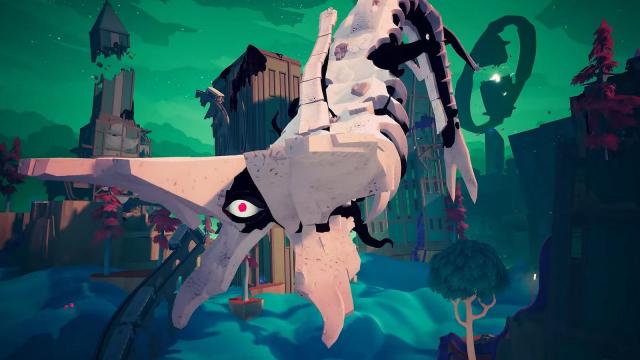
My favorite boss to fight, The Withered Eye, occurs on a neighboring moon where the massive anomaly is almost as large as the moon itself. For this fight, instead of just locating a hook, you must bait an attack, strike at each of the weak points located on the remnant’s many arms, and then the hook will reveal itself. Thrilling as this may be for each boss, the problem is that bosses are not a large part of Solar Ash despite being the most fun. Each boss can take about an hour to get to, but is typically defeated in around 10-15 minutes. This essentially means that the worst part of the game, which is wandering from anomaly to anomaly until you have defeated enough to lure out a boss, is the majority of what you’ll experience here.
There are some other things to do within the ultravoid, however. You can choose to spend your time collecting plasma, which can only be described as globules of floating blood. Once you collect enough plasma you can speak with your A.I. companion, Cyd, and unlock a shield upgrade. This is all well and good, until you have enough within the second area to purchase all of the available shield upgrades and no longer have any significant drive to collect them anymore. Solar Ash tries to balance this by destroying a piece of your shield every time you defeat a boss, but you’ll likely have enough to make up for that without going out of your way to collect them.
Then there are Voidrunner stashes, as I’ve mentioned previously, which are hidden caches that contain logs of the crew you were sent to save. Each cache also provides a piece of armor. Collecting five Voidrunner stashes nets you a brand new suit with new capabilities; however, the suit upgrades aren’t particularly interesting or helpful, and two of them become completely useless by the end game. Though initially I was looking for the Voidrunner stashes to get new pieces of armor, I eventually began looking for them in order to piece together the story of Rei’s crew.
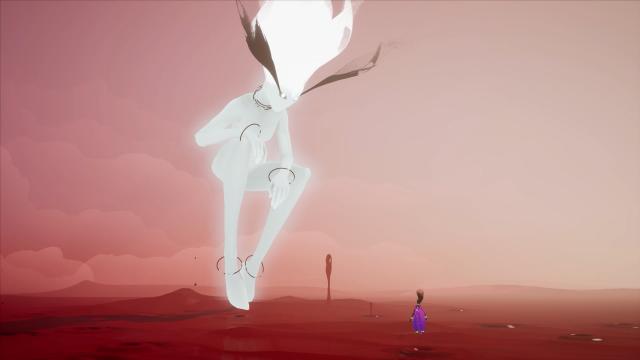
Lastly, there are also several NPC’s in the ultravoid. These NPCs give you a few tasks to complete to help them on their quests. One, for example, is a crustacean alien who seeks to understand where his own crew went and why he hasn’t heard from them. Despite being completely optional, these stories were rather emotionally impactful and fit into the overall narrative of the game. You’ll want to complete these optional quests, despite the tasks themselves being rather mundane.
But therein lies the problem. The story and sense of dread are pronounced. You begin to feel lost in a void surrounded by death and destruction with nothing to do but keep your eye on the goal. Feelings of poignancy and desperation are evoked throughout, and it leaves an incredible impact on you. Yet, the gameplay just doesn’t have me wanting to revisit the title for another playthrough. Nothing is intrinsically bad about it, it just feels like it could have been so much more. The final area, Luminous Peak, as well as the boss fights, provide a look at how great the game could have been had it just included more of them. Instead, you wander from place to place repetitively with little to motivate you aside from the story. It’s unfortunate, because I think that this title and the developers have so much going for them, and I truly wanted to enjoy Solar Ash more than I did. The developers at Heart Machine have created a game with an impeccable amount of heart, it’s just a shame they didn’t give it enough soul.
VGChartz Verdict
6.5
Decent
This review is based on a digital copy of Solar Ash for the PC, provided by the publisher.
More Articles
Congrats on your first review, Miles! Great read!
Thank you very much!
Congrats on your first review!! It's very well-written! Got my attention right away and sustained my interest throughout.
I gotta say though that my experience was different. I mean that literally: I played it on the PlayStation 5 recently (which I suspect is how most will play it if they ever do) and didn't experience the frame rate issue you're describing. Ran buttery smooth for me! I can see how frequently experiencing the kind of severe frame rate drops you describe could take a lot away from the game. I will agree with your critique of the controls as a little too slippery because I felt the same way; like not every failure was really and truly my fault. It's not a totally perfect game for sure.
I don't have time at the moment to go into detail, but I will write another, spoiler post here later (prolly this evening) that I'll mark appropriately as a spoiler entry to explain my own experience more fully because the story was central to my enjoyment of the game, so I need to talk a little bit about that. This was like an 85% grade game for me.
Hey, thanks for reading! I'm glad that the PS5 version ran better. During my research I did see some complaints for the framerate for PS5, but it's very possible it was before a patch went live or they just weren't actually that large/frequent so only a few people noticed them. Either way, I'm glad you enjoyed the game! I'm going to keep my eye on this developer for the next thing they make for sure.
SPOILERS!
As promised earlier, here are my spoiler-y thoughts on the game:
For me, there was a process to my development of appreciation for Solar Ash. The premise of needing to save your planet from being sucked into the Ultravoid I didn't care for. Seemed as kinda generic superhero type stuff that I get bored with often these days. The atmosphere, however, got me right away and that's what hooked me. Being someone who struggles with depression a lot, I found the melancholy tone set by the soft neon-like color scheme, the gentle synth wave background music, and the clouds that form the ground you skate on, for example, relatable and the absence of lots of enemies to dispatch in favor of simple puzzles and tests of efficient platforming sort of relaxing even, and the first boss fight I found downright majestic. At the same time, from the first time I poked out one of those massive eyeballs, I felt kind of bad.
Then I got to have my first at-length chat with Cyd. I had mixed feelings about that. On the positive side, I found the writing refreshingly efficient in its delivery of pertinent information (in stark contrast to yours truly) and the voice acting delightfully free of the overacting I often gripe about being too commonplace in games in favor of conveying a certain stylish level-headed competence. But that brings me to a gripe: the characters have an aura of cool about them, but as much was undermined by the pathetic framing of their conversation, which has Rei asking for information that the player might want to know, but which SHE the character definitely already should, like why she's there and who the Voidrunners are, for example. There had to be more believable way to get that information across. That put me off a little and had me on the fence about the game for some time after. To make matters worse, it was only so long before the game's formulaic structure started feeling repetitious. It was fun in principle, but reached a place of feeling perhaps a bit overdone. That said, I did think the decision to divide the game up into stages instead of using a proper open world worked very nicely in the absence of any real loading times to deal with and made the experience flow better than it might have otherwise.
What kept me going? It was the characters you met, the logs, and the lore that was being gently established through them. On the one hand, the game didn't spend enough time with any one character to where I really felt like misty-eyed or anything by revelations about them, but there was a slow, cryptic drip, drip, drip of background about "cycles" and the ethics of multiple beings joining into one consciousness and how what I was doing somehow connected to that that grew on me more and more the more I discovered, to the point where soon I found the background story here an irresistible pull to explore and discover more about what the hell was going on here! My final interaction with Cyd was a game-changer that left me in a place of knowing what I'd been doing the whole time was immoral and feeling a genuine connection to Cyd and their seemingly unconditional understanding of and self-sacrificial compassion toward Rei's character flaws. NOW I got misty-eyed! Where once I'd viewed Cyd as a very robotic sort of borderline annoyance, now I shared Rei's emotional dependence on their compassion. I mean look I'll freely admit that I'm a pretty flawed person myself (I often relate most to villain characters in games, in fact) and I know this. This shit gets to me.
The way a game concludes can make or break it for me sometimes. In the case of The Medium earlier this year, the lazy, cowardly conclusion ruined a lot of the experience of the game for me. In the case of Solar Ash, by contrast, the conclusion, more than anything else, made the game a memorable experience that cements it as something well above average and, in fact, one of my overall favorites of this year.
Let me start off with my complaint though: the format of things coming down to a good/evil dialogue choice triggering one of two endings -- one the clear real ending and the other a throwaway indicating nothing more than that you made the wrong choice -- I found kind of annoying. I wish the developers had taken the time to instead show how Echo successfully convinces Rei not to activate the Starseed because where their exchange leaves off, Rei seems tonally committed to going through with doing so, to which end the first time I decided to activate it just because that option felt the most in-character for Rei...and for me too, tbh. I mean it's clear what the moral choice is, but I was really feeling Rei's personal need to believe that she could go back in time and undo things and in that way save her world. That felt like a visceral belief that she remained dependent on in this moment right through her convo with Echo to me.
Anyway, once you make the "choice" that you're supposed to -- the one that actually allows the narrative to progress -- now there is where I felt the game was at its very strongest of all. I could not have predicted that you'd switch to controlling Echo instead to conclude the game! I mean it's not that uncommon for a game to have you switch between characters, but by this late stage of the game, my role as Rei had been pretty firmly cemented in my mind, so it genuinely caught me off guard to have that happen at the very end of the game!
All in all...the world you're trying to save is actually already gone and in fact is the cloud you've been skating on the whole time, Echo is, in fact, Rei's alter-ego; the part of herself she's suppressing by trying to activate the Starseed, Remnants are what people become by failing to accept loss so that they can move forward with life, and Echo and Rei reuniting as one being is vital to the success of doing so. You can get the mental health-oriented metaphors and commentary going on here to find a message about the necessity of acceptance and, in my take on it anyway, also maybe about the vanity of most other games' power-building play structures (which might also explain philosophically why such an approach is largely absent from this game). Solar Ash ain't the only game to hit on these types of themes, but they tend to hit home for me because, well, let's just say that loss is a subject I'm painfully familiar with, and this game's delivery of that message stands out as a refreshingly novel one. I just wish that the anarchic nature of the game's clearly (here's that word I like to use again!) heartfelt ending had been more reflected in other aspects of the game's otherwise somewhat over-structured, overly formulaic game play design. Still, Solar Ash wears its influences on its sleeve and I was feeling the (thematically fitting) nostalgia for games like Jet Grind Radio and Shadow of the Colossus involved.
Hey Jaicee,
Thank you for your thoughts! It seems we had similar feelings with regard to the overall story. I didn't mention it in my review because I wanted to free people from spoilers, but when I mentioned foreshadowing I was alluding to two things: 1) throughout the story, especially when you start doing the side quest-esque narrative tasks for NPC's, they start building up to the fact that there is a timeloop in a pretty obvious way and 2) the game basically gives away the good/bad ending result before you are actually given the decision. In my opinion, I think that Echo should have remained callous to Rei about the never ending hardship that she is forced to endure as she was during the start of the game. If this would have been done then it would have been completely the players decision, through no guidance by Echo, to stop the cycle. By giving it away too early the game influenced my decision to not activate the starseed because I knew that was the right thing to do. However, had Echo not begged Rei to listen to her then I think most players would have been more likely to activate the starseed. This would have also reinforced one overarching theme of the game as well, in that Rei's misguided ambition to activate the starseed stems from her inability to consider the option to choose.
No problem! And again, I was glad to get your perspective on the game too.
As to the good/evil dialogue choice near the end of the game, like I said before, I knew that activating the Starseed was immoral before I even spoke to Echo near the end of the game from lots of context clues that became especially obvious from my last convo with Cyd, so there wouldn't have been a way to alter the exchange between Rei and Echo in a way that made the question of whether to activate the Starseed feel morally neutral for me. Personally I'd have preferred that the choice not even be there, but rather that the developers would've fleshed out Rei's process of opting against activating the Starseed within the framework of her exchange with Echo. I mean the bad ending doesn't even need to be in the game, as the only new content therein is just a few seconds of Rei being transformed into a Remnant (the rest being just the time loop starting over, retreading the same content from the beginning of the game), whereas you fight her in her Remnant form anyway in the other ending, so it's not like you'd miss any information if the bad ending just wasn't there. You see what I mean? That's my opinion.








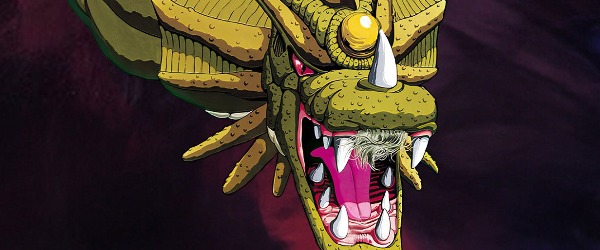
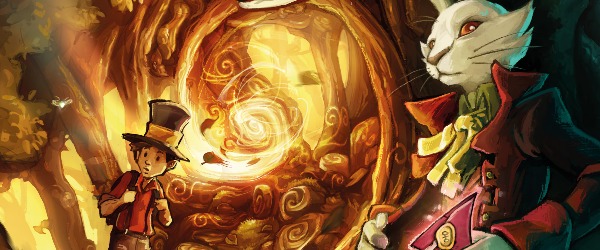
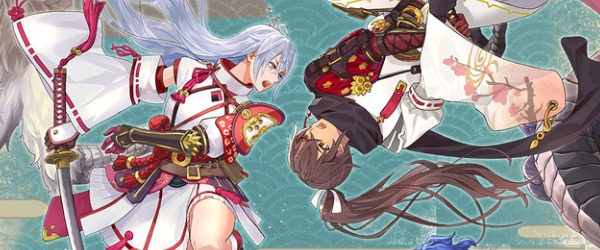
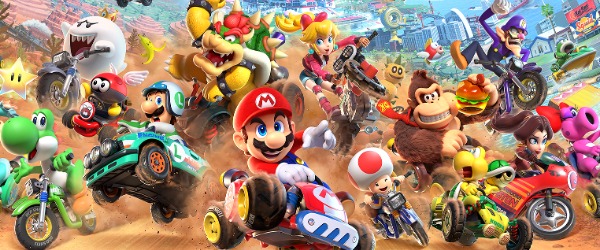













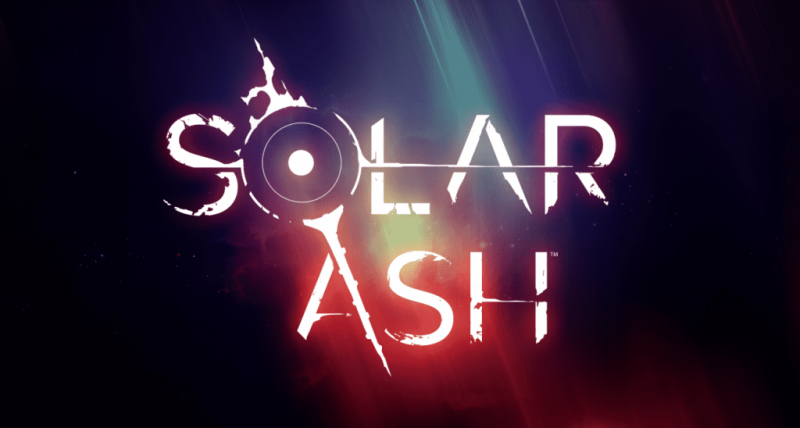



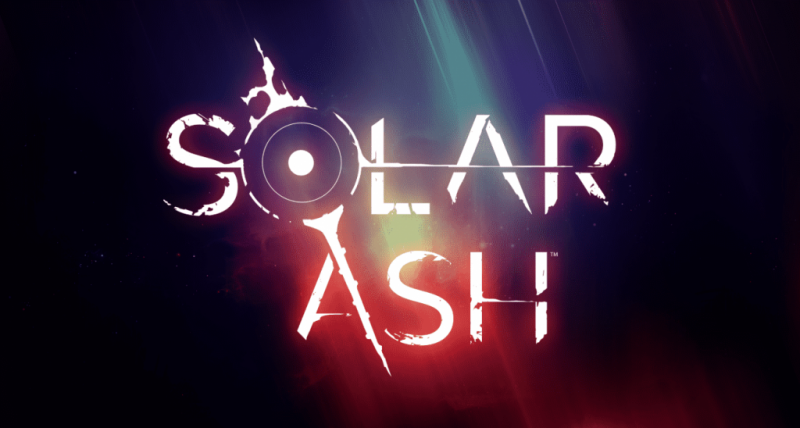

 Essay Pro
Essay Pro